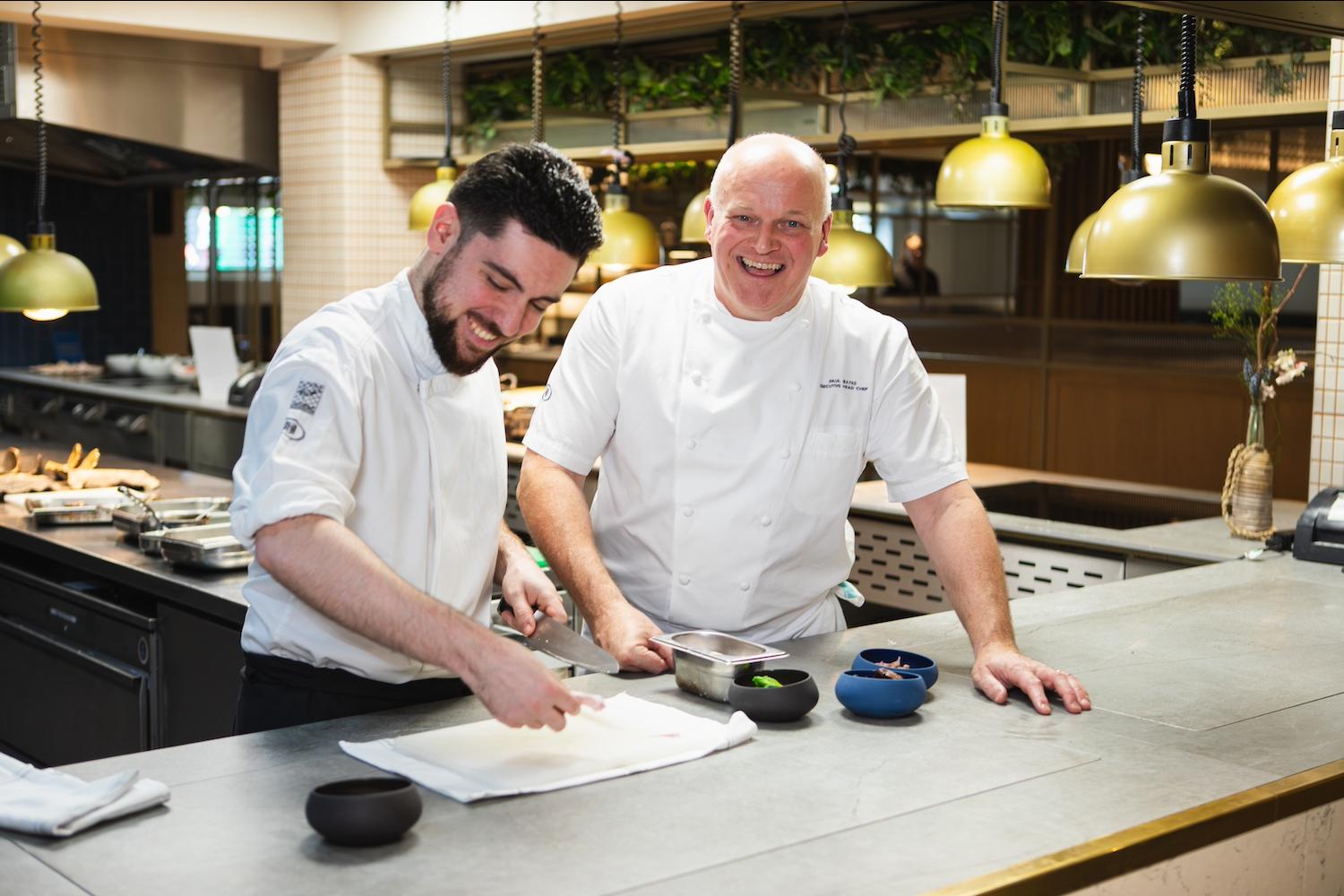
Paul Bates, executive head chef at the Hilton London Metropole (right), works with another Hilton chef on a dish for the hotel's zero waste menu pilot project. (Image courtesy of Hilton.)
Just over 30 percent of the food produced in the United States goes uneaten or unsold, generating 10 percent of the country’s methane emissions and costing the economy $382 billion annually, according to the food waste solutions nonprofit ReFED. Hotels are the third-largest contributors to foodservice-related food waste in the U.S. Global hospitality giant Hilton is joining a growing national effort to reduce food waste across the country, using lessons it learned in Europe, the Middle East and Africa.
“We know hospitality accounts for about 3 percent of food waste globally, and we’re laser-focused on reducing it, not just because it reduces emissions, but also because it is good for the bottom line,” said Emma Banks, Hilton Hotels and Resorts’ vice president of food and beverage strategy and development for Europe, the Middle East and Africa. “Guests engage in purpose-led companies, and it also helps attract and retain strong team members.”
Banks is instrumental in driving Hilton’s food sustainability agenda, overseeing food and beverage operations across more than 70 countries. She realized that the global hospitality company needed to invest in data to make an impact on the amount of waste they produced. “We started with the question: How do we measure food waste?” Banks said.
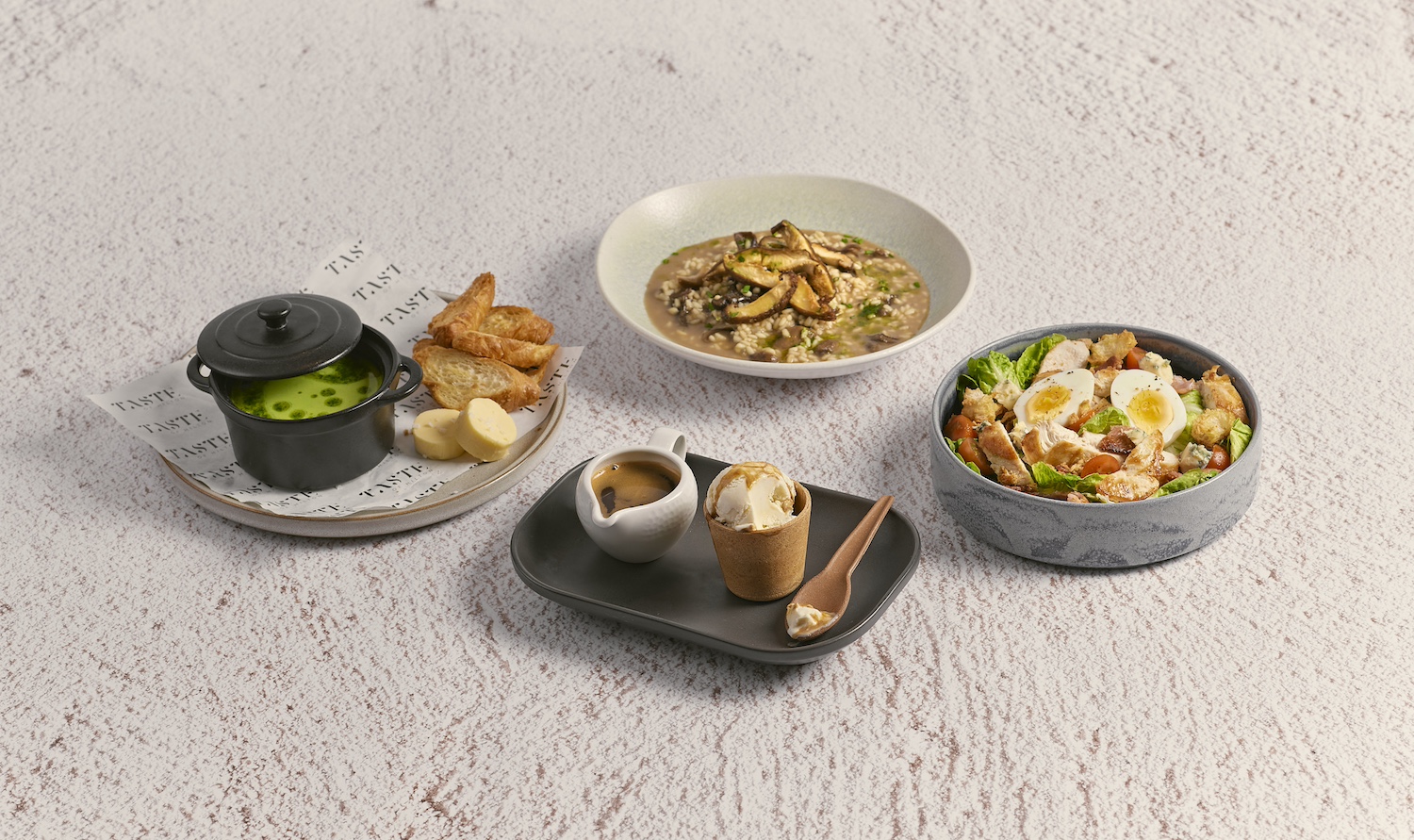
Hilton’s long-standing partnership with the commercial food waste solutions company Winnow helped answer that question. The AI-powered Winnow system uses a scale, camera and screen to analyze food waste, collecting data the kitchen can use to inform its efforts to waste less.
“In the kitchen, you have scales and a camera,” Banks said. “Whether it’s plate waste or production waste, team members scrape food into a bin on the scale. It’s photographed and weighed. Then reports go to the chefs.”
More than 200 Hilton hotels have installed the system, mostly in Europe, the Middle East and Africa. They use insights from Winnow to guide buffet layout and production, now offering smaller portions, more cook-to-order stations and reduced backstock.
“Instead of five backup trays, we might have just one,” Banks said. “Egg dishes are cooked to order. Smoothies are in smaller glasses. Croissants are smaller, so guests can eat the whole thing.”
Waste prevention is deeply cultural. In some regions and seasons, generosity is expressed through abundance. So Hilton tailors its messaging around food waste to be considerate and connected to customs and values. One example is its program inspired by the Islamic holy month Ramadan.
“We partnered with the United Nations Environment Program and crafted a Green Ramadan program under the slogan, ‘Halve the waste, double the blessings,’" Banks said. “It resonated. We were in three hotels the first year, and this year we were in 45 hotels across 14 countries.”
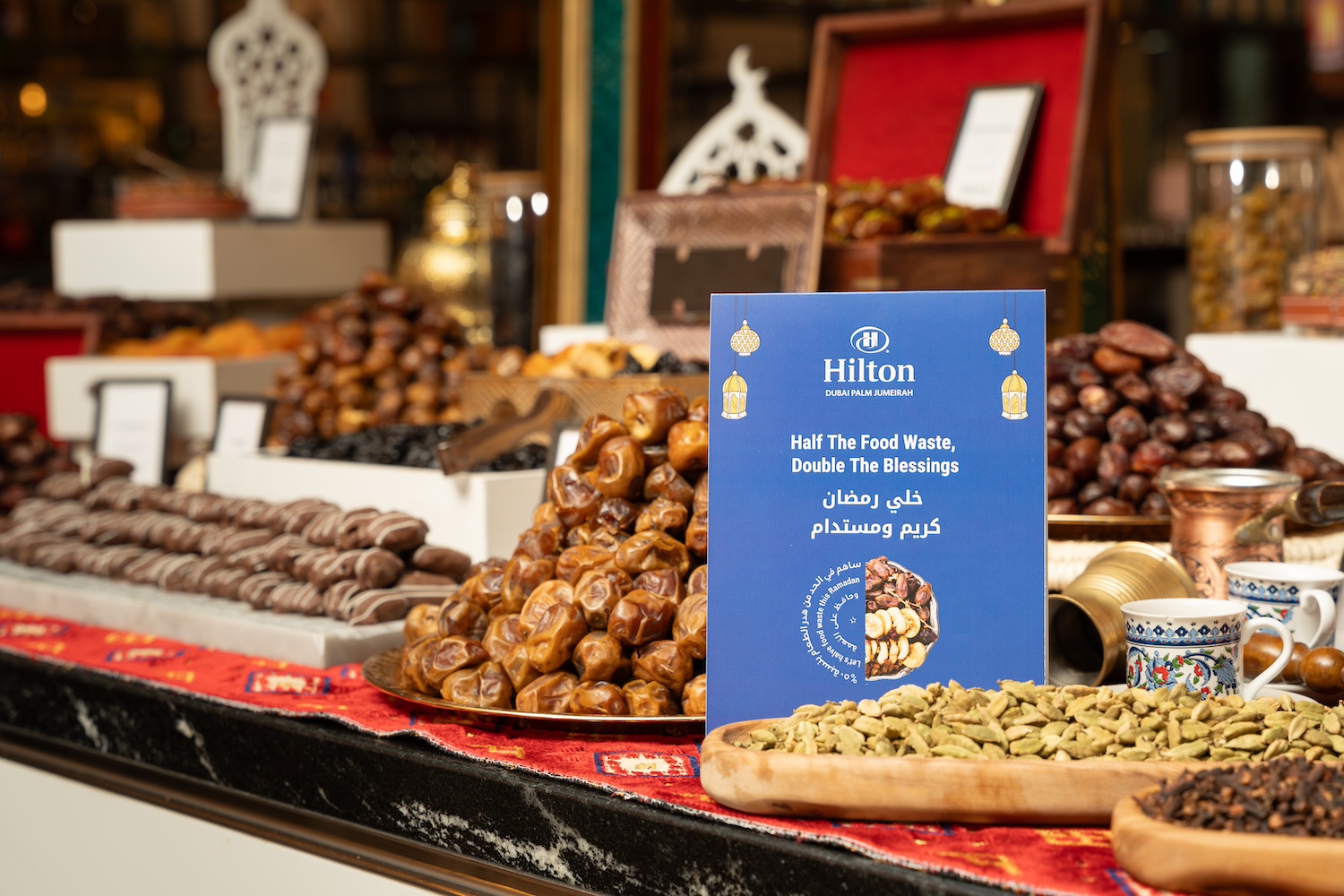
The company found small changes make a big impact. “In our first Green Ramadan at Conrad Dubai, about 74 percent of the food waste came from bread and pastry,” Banks said. “People take huge baskets to the table and then leave them untouched. We changed the model to bread on request — warm and fresh. Waste plummeted.”
The success of the Green Ramadan program inspired Hilton’s Green Breakfast initiative. “We saw similar results,” Banks said. “In some properties, food waste fell by more than 60 percent. Once you demonstrate the success, managers at other properties want to join. It’s a mindset shift.”
In hopes to expand its offering of regional and cultural programs, Hilton developed a comprehensive toolkit with training resources, and it ensures its hotels are staying engaged.
“People have to apply to join programs like Green Ramadan,” Banks said. “They’re vetted to ensure commitment. Once they’re in, there are regular calls and check-ins, and Winnow follows up when hotels aren’t recording. It’s constant engagement.”
Hilton is also tapping into the creativity of their chefs, who create new zero-waste recipes and menus. “We have 50-mile menus, root-to-shoot and nose-to-tail dishes, and fermented and pickled items,” Banks said.
Banks said she sees creative, sustainable cooking as a driver of success. “Chefs are artists and nurturers,” she said. “Waste is not waste until you waste it. It’s an ingredient. Some chefs are using dehydrated banana skins as a baking powder. Some are making what they call ‘trimchi,’ a kimchi-style dish using watermelon rinds. Every month, we have new themes. Sustainable gastronomy has become a badge of honor.”
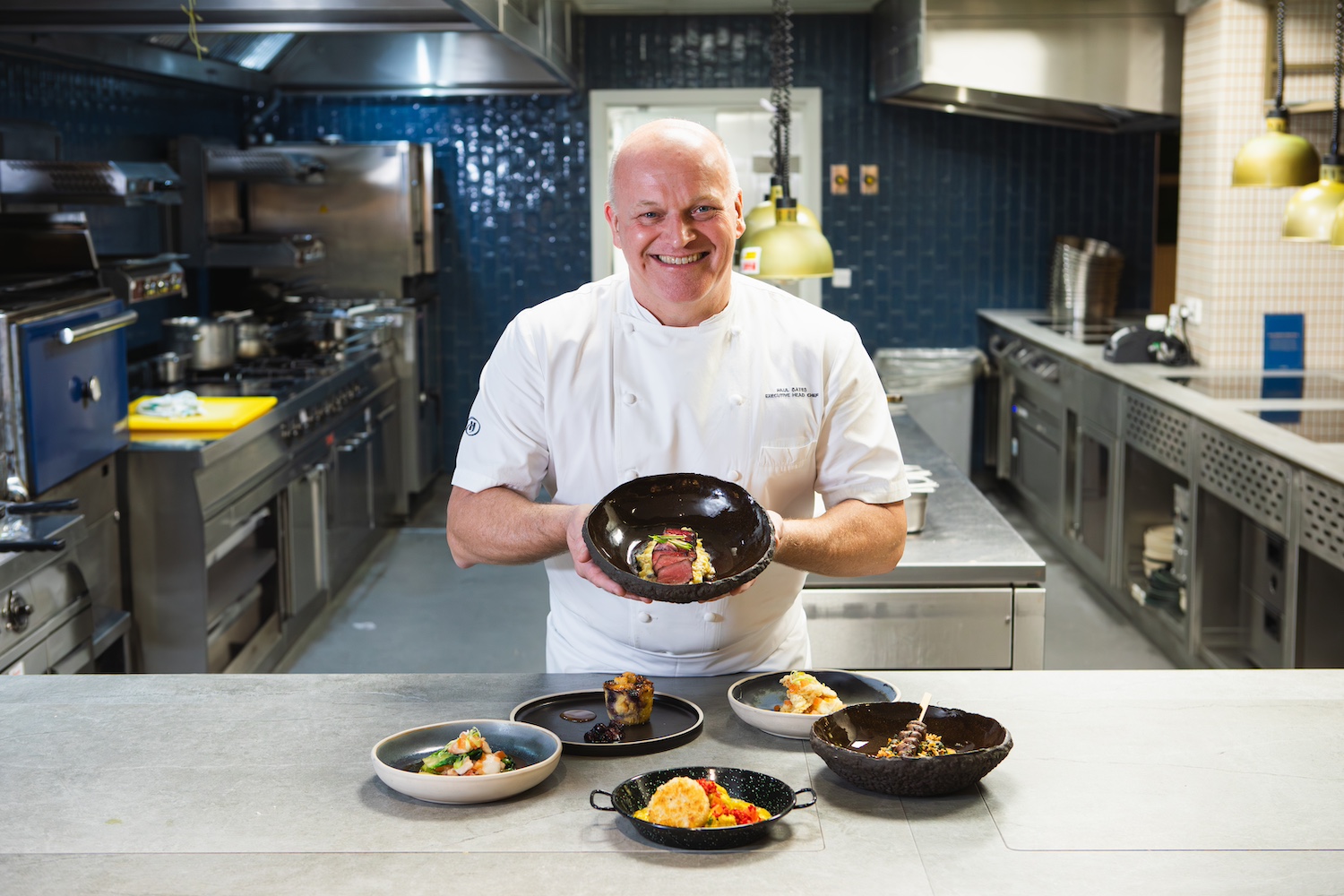
Scaling still comes with barriers, including awareness, resources and logistics. “Sometimes kitchens are six floors away from the buffet,” Banks said. “Sometimes volume fluctuates wildly. We have to be nimble responders.”
To account for some of that excess volume, some European Hilton properties work with the surplus food marketplace Too Good To Go and local food banks to divert surplus, and they compost where regulations allow. “We reuse, divert, donate and recycle,” Banks said. “The landfill is the last option.”
Looking forward, Hilton plans to expand its successful pilots from Europe, the Middle East and Africa into North America and the Asia-Pacific region. It recently became the first hospitality company to sign the U.S. Food Waste Pact, joining a growing national effort led by nonprofits ReFED and World Wildlife Fund (WWF) to reduce food waste across the country. Hilton’s joining represents a major milestone for the effort. Before this, the pact lacked representation from the hospitality sector. Eventually, the Hilton hopes to inspire industry-wide change.
“We’re chasing a dream: to use what we’ve learned to make change beyond Hilton,” Banks said. “If we can get global suppliers to reduce croissant sizes, for example, that is a change that can go beyond us and run through the entire value chain.”
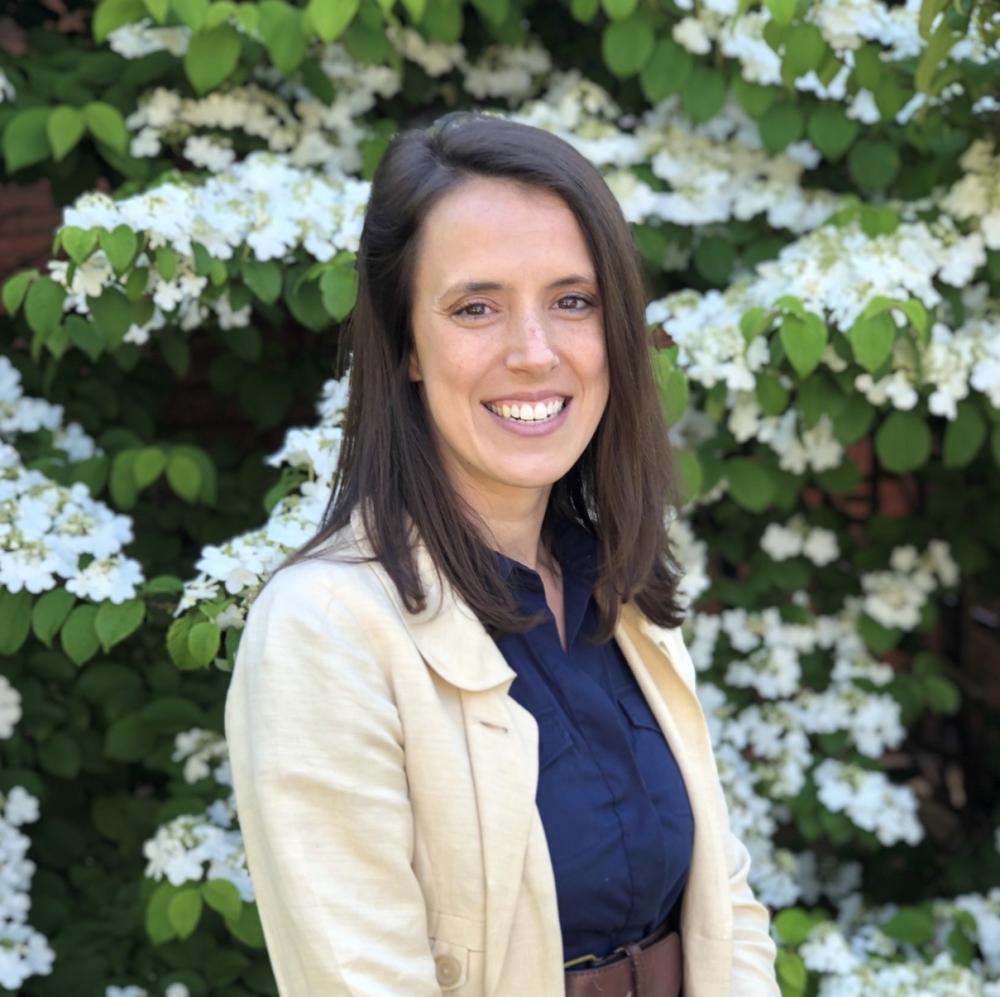
Mary Riddle is the director of sustainability consulting services for Obata. As a former farmer and farm educator, she is passionate about regenerative agriculture and sustainable food systems. She is currently based in Florence, Italy.














